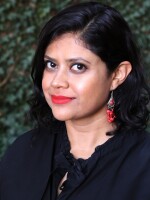When Amir Makled was asked to step into an interrogation room at the Detroit Metro airport after flying back into the U.S. from a family vacation on Sunday, he had some questions of his own. He asked if he was being detained because he’s a lawyer or because of the types of cases he works, and was told that his detention was a matter of protocol.
“But,” he told Michigan Public afterward, “they did mention to me that they knew that I was a lawyer taking on some higher profile cases, and the only high profile case I’m currently involved in is defending one of the University Michigan protesters.”
Makled represents Sammie Lewis, who is one of the seven people charged with felonies by the Michigan Attorney General for allegedly resisting arrest during a police raid on a pro-Palestinian encampment in May.
Federal agents at the airport "basically said, ‘We want to go through your text messages, your emails, your communications, your contact lists,’” Makled recalled. “I said no, I'm an attorney, not giving you this access.”
He did allow them to see the contacts in his phone, and, after 90 minutes of detention, he said, he was able to return to his wife and children who had been allowed to step aside while he was being questioned.
Makled contends that he was targeted because of his work. The Trump administration has taken aim at lawyers in recent weeks. An executive order issued last month takes aim at those in the legal profession who “engage in actions that violate the laws of the United States or rules governing attorney conduct.”
He has also pointed to antisemitism on college campuses as a major concern.
In one of President Donald Trump's first executive orders since taking office in January, he decried the Hamas-led attack on Israel last October. “These attacks unleashed an unprecedented wave of vile anti-Semitic discrimination, vandalism, and violence against our citizens, especially in our schools and on our campuses,” it read. “It shall be the policy of the United States to combat anti-Semitism vigorously, using all available and appropriate legal tools, to prosecute, remove, or otherwise hold to account the perpetrators of unlawful anti-Semitic harassment and violence.”
Since then, the federal government has revoked the visas of at least 300 international students, some of whom have been involved in demonstrations around U.S. foreign policy toward Israel and Palestine.
"If you apply for a visa to enter the United States and be a student, and you tell us that the reason why you're coming to the United States is not just because you want to write op-eds, but because you want to participate in movements that are involved in doing things like vandalizing universities, harassing students, taking over buildings, creating a ruckus, we're not going to give you a visa," Secretary of State Marco Rubio said during a press conference in Guyana in March. "If you lie to us and get a visa then enter the United States, and with that visa, participate in that sort of activity, we're going to take away your visa."
Despite this, a Customs and Border Protection official said Makled’s relatively brief detention had nothing to do with this profession or his politics.
“This lawyer’s accusations are blatantly false and sensationalized," Assistant Commissioner Hilton Beckham told Michigan Public in a statement. "Upon entering the country, he was flagged and referred to secondary inspection — a routine, lawful process that occurs daily, and can apply for any traveler."
Beckham said immigration officers followed established protocols, ensured that attorney-client privilege was not violated, and obtained written consent from Makled for a limited search of his device.
“Claims that this was an attack on his profession or were politically motivated are baseless,” he said. “Our officers are following the law, not agendas.”










